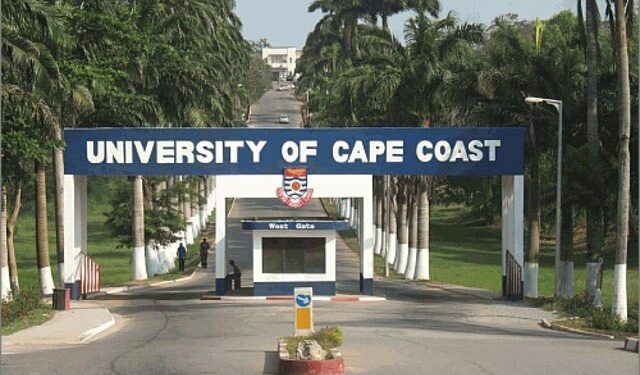
UCC to run to a halt - 70,000 Students, 4000 staff to bear GTEC brunt
The impasse between the Vice-Chancellor of the University of Cape Coast (UCC), Professor Johnson Nyarko Boampong, and the Ghana Tertiary Education (GTEC) is gradually disrupting academic and administrative activities, potentially affecting more than 70,000 students and 4,000 staff.
When Graphic Online visited the UCC campus on Tuesday [Sept 23, 2025], workers were going about their normal duties; however, sources indicated that the punitive measures taken by GTEC had already taken effect, jeopardising the university’s plans and activities, both in the short term and for the foreseeable future.
Read also: GTEC restores all services to University of Cape Coast following compliance with directive
At the heart of the dispute is a directive by GTEC for Prof. Boampong to proceed on retirement, as, in the wisdom of the commission, the Vice-Chancellor had reached the compulsory retirement age of 60, and should retire in line with Article 199 (1) of the Constitution.
However, Prof. Boampong insists that the extension of his contract for a further two years from August 1, 2024, to July 31, 2026, was in accordance with the UCC Statute and Article 199 (4) of the Constitution.
Legal framework
According to regulation 8.2 of the University of Cape Coast Statute, “the Vice-Chancellor shall hold office for an initial term of four years.
The appointment may be renewed for a further term of up to three years if that is not beyond the statutory retiring age of 60.”
Article 199 (1) of the Constitution stipulates that “A public officer shall, except as otherwise provided in this Constitution, retire from the public service on attaining the age of sixty years.”
Clause (4) adds that “Notwithstanding clause (1) of this article, a public officer who has retired from the public service after attaining the age of sixty years may, where the exigencies of the service require, be engaged for a limited period of not more than two years at a time but not exceeding five years in all and upon such other terms and conditions as the appointing authority shall determine.”
Impasse escalates
The impasse was further escalated when GTEC imposed punitive measures on UCC after its earlier directive for Prof. Boampong to proceed on retirement fell on deaf ears, virtually delisting the university from public universities, and rendering it “non-existent”.
As part of the punitive measures, GTEC decided that it would not process any request from UCC in respect of accreditation, salaries (government subventions), Ghana Education Trust Fund (GETFund) support, Book and Research allowances, Post Retirement Contracts and Financial Clearance for Recruitment, among others.
Dialogue
Stakeholders have called for dialogue to resolve the impasse, instead of the entrenched positions, in the interest of the entire university community.
At an emergency meeting yesterday, the University Teachers Association of Ghana (UTAG) called on all parties to let cool heads prevail as stakeholders work towards an amicable resolution to the dispute.
The branch President of UTAG, Dr Jerry Opoku Ansah, said the punitive measures by GTEC were not in the interest of any party, but would rather exacerbate the situation, with students and workers bearing the brunt, and their welfare being destroyed in the process.
The Head of Legal of UCC, Solomon Faakye, told Graphic Online that the action by GTEC was premature as the matter was still a subject of litigation before the Cape Coast High Court, and yet to be determined.
“There is an injunction, and, therefore, the University Council has been restrained from acting until the High Court determines the question of whether or not the Vice-Chancellor can continue to act in line with the university’s statute,” he said.
He, however, expressed optimism that the matter would be resolved very soon so that the university could continue with its operations.
“I think that cool heads will prevail. Engagement and dialogue are the only ways out because it will be practically impossible for GTEC to say that it will not perform its public duties to another public institution funded by the taxpayer. GTEC can have a problem with the Vice-Chancellor but why should students and workers suffer?” Mr Faakye queried.
However, should dialogue not resolve the issue, he said, the university would not hesitate to go to court to assert its rights.
Background
On June 17, 2020, Prof. Boampong was appointed as Vice-Chancellor of UCC by the university council for a four-year term, which took effect from August 1, 2020, to July 31, 2024.
The UCC Council on July 28, 2023, renewed Prof. Boampong’s contract for a further two years, from August 1, 2024, to July 31, 2026.
However, on July 31, 2024, the UCC Council purportedly revoked the extension of Prof. Boampong’s contract for two years, citing Article 199(1) and the UCC statute.
Even before the alleged revocation of the contract extension, the matter had already moved from the UCC Council Chamber to the courtroom, with one John Mevemeo filing a suit challenging the extension.
Mr Mevemeo contended that the renewal of Prof. Boampong’s contract was illegal, as it violated the provisions of the 1992 Constitution and the UCC statute.”
On October 8, 2024, the Cape Coast High Court, presided over by Justice John-Mark Nuku Alifo, granted an interlocutory injunction against the UCC, the university council and anybody, acting on behalf of UCC, from “taking any decision that will reverse the appointment of Prof. Boampong” until the final determination of the suit challenging his appointment.
Dissatisfied with the decision of the High Court, GTEC and UCC filed a judicial review application at the Supreme Court seeking an order of certiorari to quash the ruling for an interlocutory injunction.
On February 5, this year, a five-member panel of the Supreme Court, presided over by the then Chief Justice, Justice Gertrude Torkornoo, dismissed the judicial review application.
“We are satisfied that the supervisory jurisdiction of this court to enter a quashing order has not been properly invoked and the application is, therefore, refused,” the court held.
